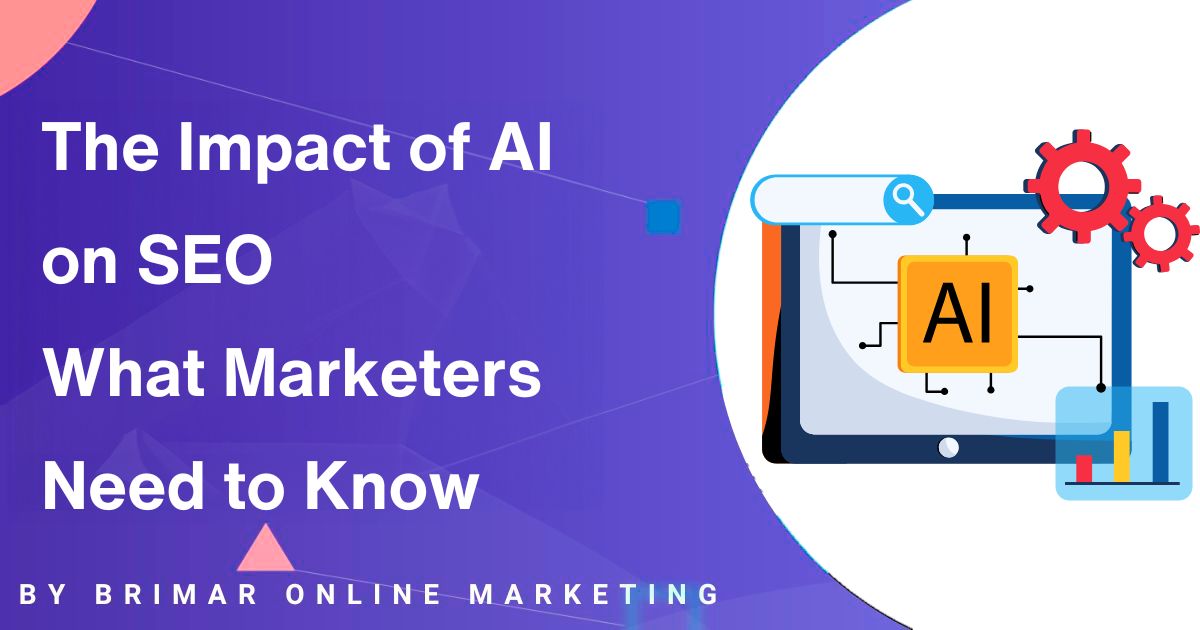
AI didn’t knock gently on the door of SEO.
It kicked it wide open.
What used to be a game of keywords and backlinks has quickly turned into a battle for relevance, intent, and deeper understanding.
Traditional organic search results aren’t what they used to be.
Today, users are often greeted with AI-generated summaries, like Google’s new AI Overviews, before seeing a single organic listing.
That means if AI doesn’t interpret your content correctly, it might not be seen at all.
This shift matters.
A lot.
Because visibility is everything.
You’re already falling behind if you’re a digital marketer still relying on old-school tactics.
The rules have changed.
Search engines are no longer just matching words; they’re trying to understand what people want, and if your strategy doesn’t evolve, your traffic and conversions will quietly slip away.
Now’s the time to adapt.
Not out of fear, but out of opportunity.
The Integration of AI and Search Engines
Search engines have leveled up.
What powers them today isn’t just code; it’s intelligence.
Search algorithms now run on machine learning models that constantly learn from user behavior, search patterns, and vast amounts of data.
Natural language processing allows them to read and interpret content more like humans.
That’s a big deal.
Especially with the introduction of AI Overviews.
Instead of users scrolling through pages of links, they’re now met with instant, AI-generated responses.
Summaries are pulled from various sources.
Context-rich insights.
No click is required.
This means your content has to work harder.
You’re no longer just writing for users but also for the AI models behind the scenes.
These large language models decide what makes it into those summaries and what doesn’t.
You risk getting skipped over if your content isn’t optimized for them.
Search is no longer about stuffing keywords into a page.
It’s about delivering the best answer most smartly.
Start Attracting Customers Through SEO Today!
We can help you attract new customers through Tailored Search Engine Optimization Strategies for Your Business.
Understanding User Intent in the Age of AI
Forget generic blog posts and vague keyword strategies.
They don’t cut it anymore.
AI-powered tools can now analyze user behavior, spot patterns, and understand what people mean when they type a search query.
It’s not just about what they say but what they want.
That’s user intent, and it’s the heartbeat of modern SEO.
If your content doesn’t answer the right question, it won’t rank.
It’s that simple.
That’s why keyword research has changed.
You’re not just chasing volume anymore.
You’re uncovering context.
Long-tail keywords that match how people speak, especially with the rise of voice search.
Think Google Assistant, Alexa, and other virtual assistants.
They’ve changed the game.
People talk to their devices like they talk to friends, and your content needs to match that tone.
The winners?
Marketers who pay attention to fundamental human needs and create high-quality content that solves actual problems.
Not fluff.
Not filler.
Just clear, relevant answers that feel personal.
The Role of AI in Content Creation and Generation
Let’s be honest: AI is everywhere.
Especially when it comes to creating content.
From full-blown blog posts to social captions, product descriptions, and outlines, AI-driven tools are helping marketers save time and stay productive.
That’s not a bad thing when used right.
But there’s a line between using AI to support your work and letting it take over your voice.
The magic happens when you find balance.
You use AI technologies to speed up the research, help structure your ideas, and maybe even draft a first version.
But then you take over.
You shape the tone.
You inject empathy, nuance, and personality, which machines haven’t mastered.
That’s how you protect quality and ensure your content doesn’t sound like it was built in a factory.
Search engines are smart enough to tell the difference.
They want original content.
Real value.
Authenticity.
If your pages are loaded with AI-generated fluff or duplicated ideas, you’re not just losing credibility; you’re risking penalties that could crush your rankings.
SEO best practices haven’t gone away.
They’ve just evolved.
Today, it’s about combining human creativity with AI-powered tools to deliver content that speaks to people and search engines.
That’s how you stay visible, build trust, and get results.
How AI is Transforming SEO Strategies
SEO isn’t what it used to be, and that’s a good thing.
With the help of AI, we’re not just guessing anymore.
We’re making smarter moves backed by real numbers, behavior, and real-time insights.
One of the biggest game changers is predictive analytics.
Instead of reacting to what’s already happened, marketers can now anticipate what will happen next.
AI digs through historical data, spots patterns we’d miss, and helps shape SEO strategies that make sense for your audience and goals.
That kind of foresight is powerful.
Then, there’s keyword research, competitor analysis, and technical SEO.
Let’s be honest; these parts used to be tedious.
Now?
AI-powered SEO tools speed up the process, highlight gaps in your current SEO efforts, and show you what your competitors are doing right and where they’re slipping.
That means fewer blind spots and more opportunities to get ahead.
And it doesn’t stop there.
SEO is evolving fast.
Search engine algorithms are becoming more sophisticated, AI-driven, and user-focused.
If your SEO practices aren’t adapting, they’re falling behind.
The good news is that staying current isn’t about being everywhere; it’s about using the right tools, watching the correct data, and making decisions that align with what people want to find when they search.
Personalizing the User Experience with AI
You can have the best content in the world, but it won’t do much if it’s not connecting with the right person at the right time.
AI is helping marketers fix that.
With the ability to analyze vast amounts of user data in real time, AI can figure out what your audience cares about, even before they tell you.
It tracks search patterns, browsing behavior, past interactions, and how long someone stays on a page.
All that information becomes insights that help you serve more relevant content to your specific audience.
Personalization isn’t about throwing someone’s name in an email anymore.
It’s about creating content that fits their needs, timing, and interests.
That’s how you deliver better results.
That’s how you increase engagement.
When users see content that speaks to them, their experience improves.
Click-through rates go up.
Bounce rates go down.
People stick around longer, and that tells search engines you’re doing something right.
AI helps make that connection possible at scale without losing the human touch.
Challenges and Considerations for Content Marketers
As exciting as all of this sounds, there are a few things content marketers can’t afford to ignore.
First, let’s talk about AI-generated content.
It’s fast, it’s efficient, and yes, it can be beneficial.
But it can also be flat, generic, and lifeless if you’re not careful.
Human intelligence still matters.
Your voice, your perspective, and your experience are what turn information into something worth reading.
Relying too heavily on AI models can dilute your brand.
Sure, they can mimic tone and structure but can’t replace authenticity.
People want to feel a connection when they read something.
They want to believe there’s a person on the other end of that blog post, not just a robot spitting out sentences.
And then there’s transparency.
If you’re using AI-generated summaries or pulling from AI tools to build out your content, say so.
Let your audience know how you’re working.
Honesty builds trust.
It also sets the right expectations, especially as more people know what AI can and can’t do.
So yes, AI is changing the game.
But the rules that matter most, truth, clarity, and creativity, haven’t changed at all.
If anything, they’re more important than ever.
Practical SEO Tips for the AI Era
Let’s get real.
AI isn’t going anywhere, and your SEO strategy shouldn’t ignore it.
But using AI isn’t about flipping a switch and watching the rankings rise.
It’s about making smart moves, staying grounded, and never losing touch with the people behind the clicks.
Start by getting your AI tools in sync with your brand’s voice.
If your message feels robotic or generic, you lose trust.
Use AI to speed things up, not strip away your tone.
Feed your tools with the kind of language your audience already connects with.
That way, the AI supports your strategy; it doesn’t hijack it.
Next, focus on alignment.
The best AI-powered SEO tools are useless if they’re not working toward the right goals.
Choose platforms that help you understand user intent, analyze search queries, and track the behavior of real people.
These tools can give you a deeper look at what’s working and where you’re missing the mark.
Don’t skip audits.
If it’s been a while since you’ve reviewed your online presence, now’s the time.
AI-powered tools can scan your site in seconds, highlighting technical issues, content gaps, and opportunities based on current search engine algorithms.
The goal isn’t just to show up on page one; it’s to offer something that matters when you get there.
The Future of SEO and AI
AI is changing everything, and SEO is no exception.
Search engines are evolving fast.
With generative AI tools shaping search engine results, summaries replacing snippets, and voice search rising through virtual assistants, the rules are shifting right under our feet.
But that doesn’t mean the game is over for content creators.
In fact, they’ve never been more important.
The brands that will thrive are the ones that understand how to pair AI’s precision with human connection.
People still crave content that sounds like it came from a real person, not a spreadsheet.
That’s where your edge is.
You must track how AI influences search rankings and user behavior to stay relevant.
That means paying attention to how search engine algorithms use machine learning, natural language processing, and vast data to predict what people want to see.
It means knowing how to tailor your message to match search intent, not just match a keyword.
Start small.
Explore voice search optimization.
Experiment with AI-generated summaries, but review and rewrite them with your human brain.
Study your audience.
Build content that answers their questions before they ask.
That’s what future-proofing looks like in digital marketing.
Human Creativity + AI = Best Results
AI is powerful.
But it’s just a tool.
The real power comes when human creativity leads the way.
The magic happens when content marketers use AI to sharpen their insights instead of replacing their instincts.
It’s easy to get overwhelmed with all the new tools, updates, and trends.
But here’s the thing: your voice still matters.
Your perspective is still valuable.
AI can crunch numbers, analyze patterns, and generate ideas, but it’s your job to decide which ones are worth sharing.
So, embrace the tech, but don’t lose the human.
Let AI do the heavy lifting, and you focus on the heart of your message.
That’s how you give your SEO efforts the best chance in a world that’s evolving fast.
Stay curious.
Stay grounded.
And if your goal is to create real impact, keep writing like it matters because it does.
Our SEO Services Have Helped Our Clients Increase Their Revenue!
“I highly recommend Brimar if your looking to grow your online business. You will be satisfied with the high level of expertise and high quality of services. It has helped my business grow by leaps and bounds.”
CEO

